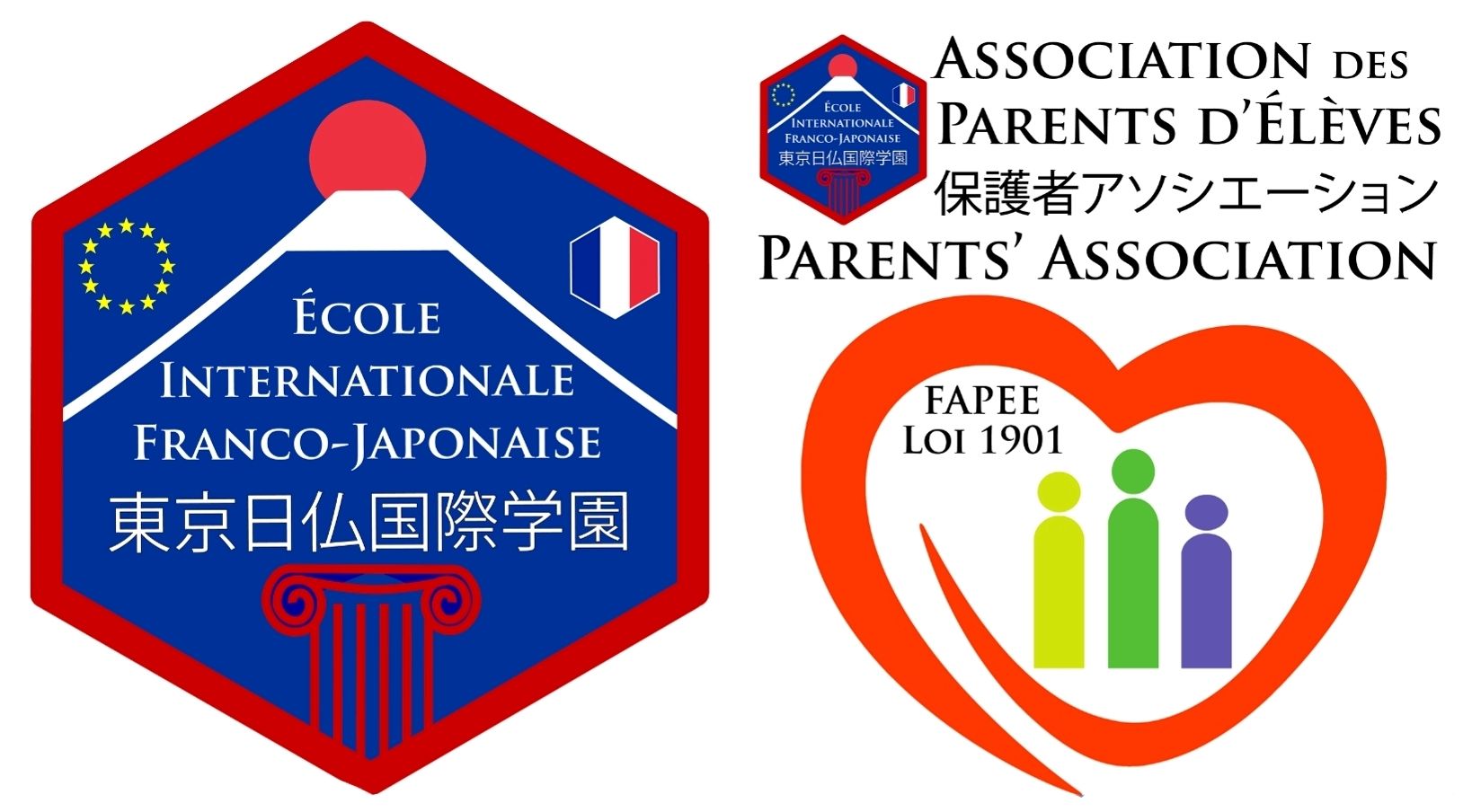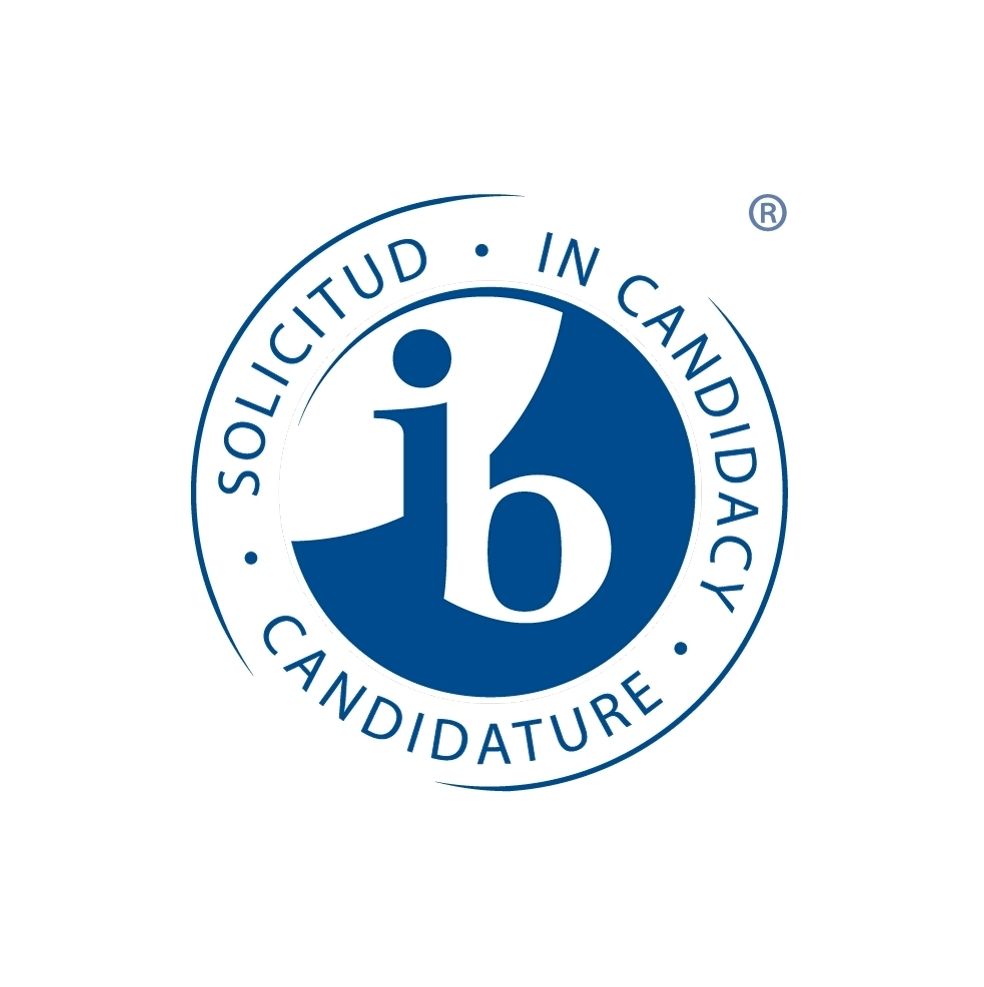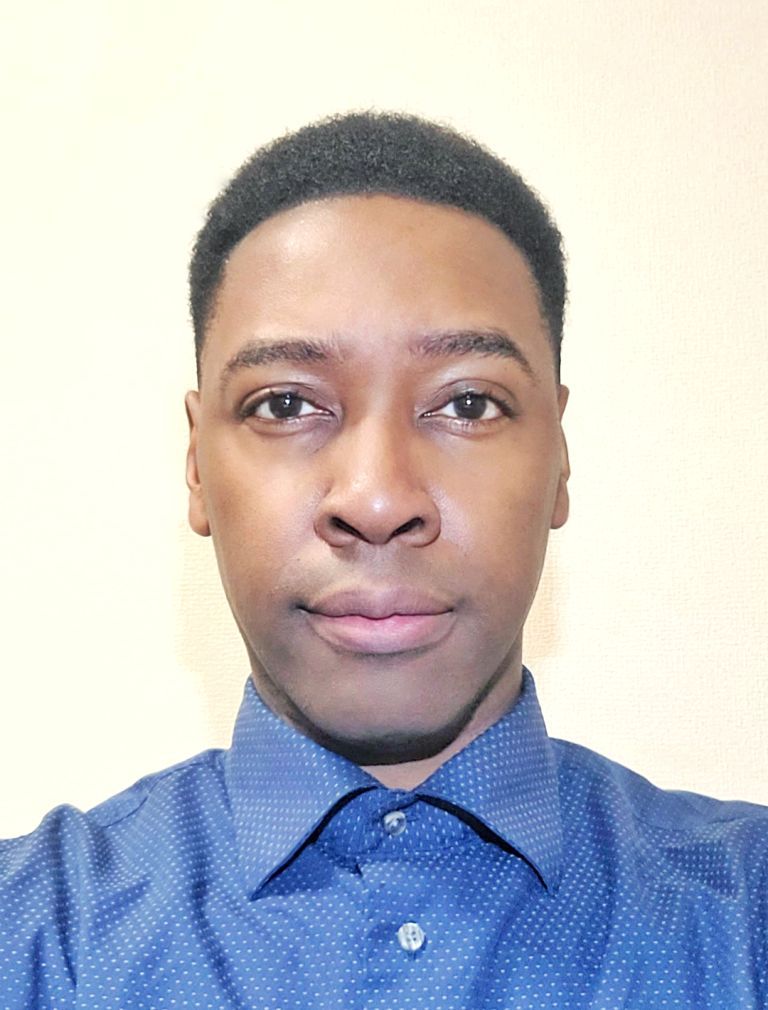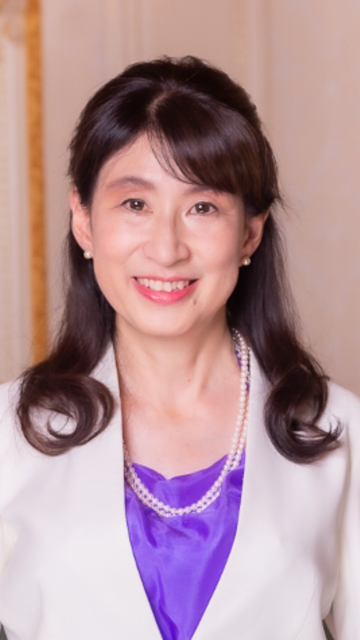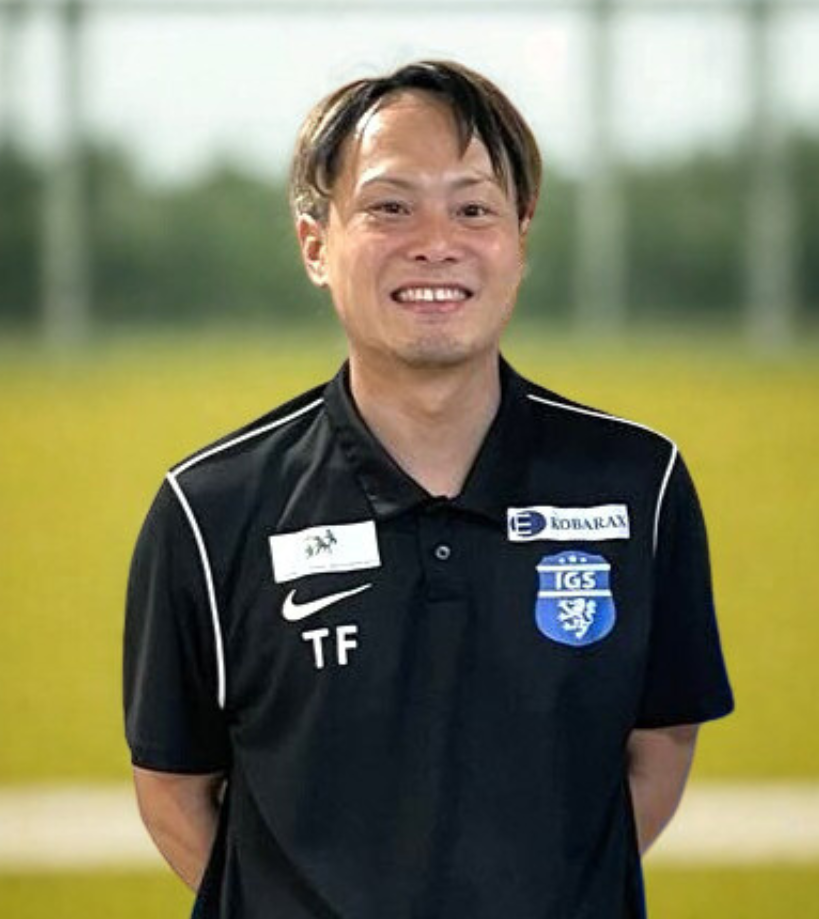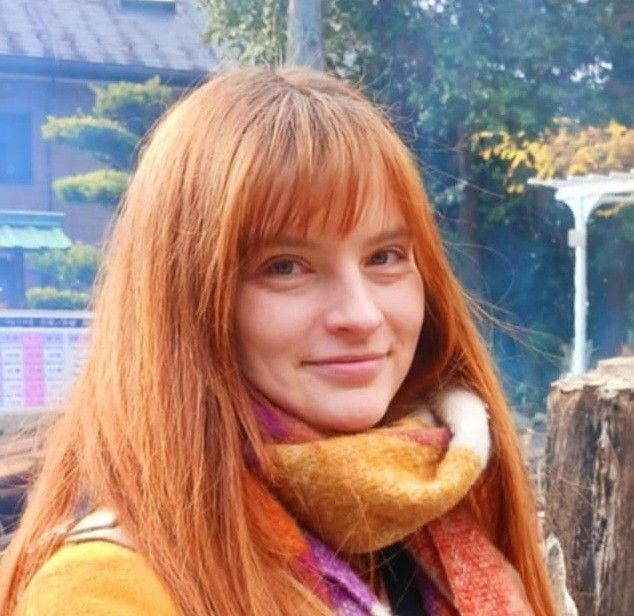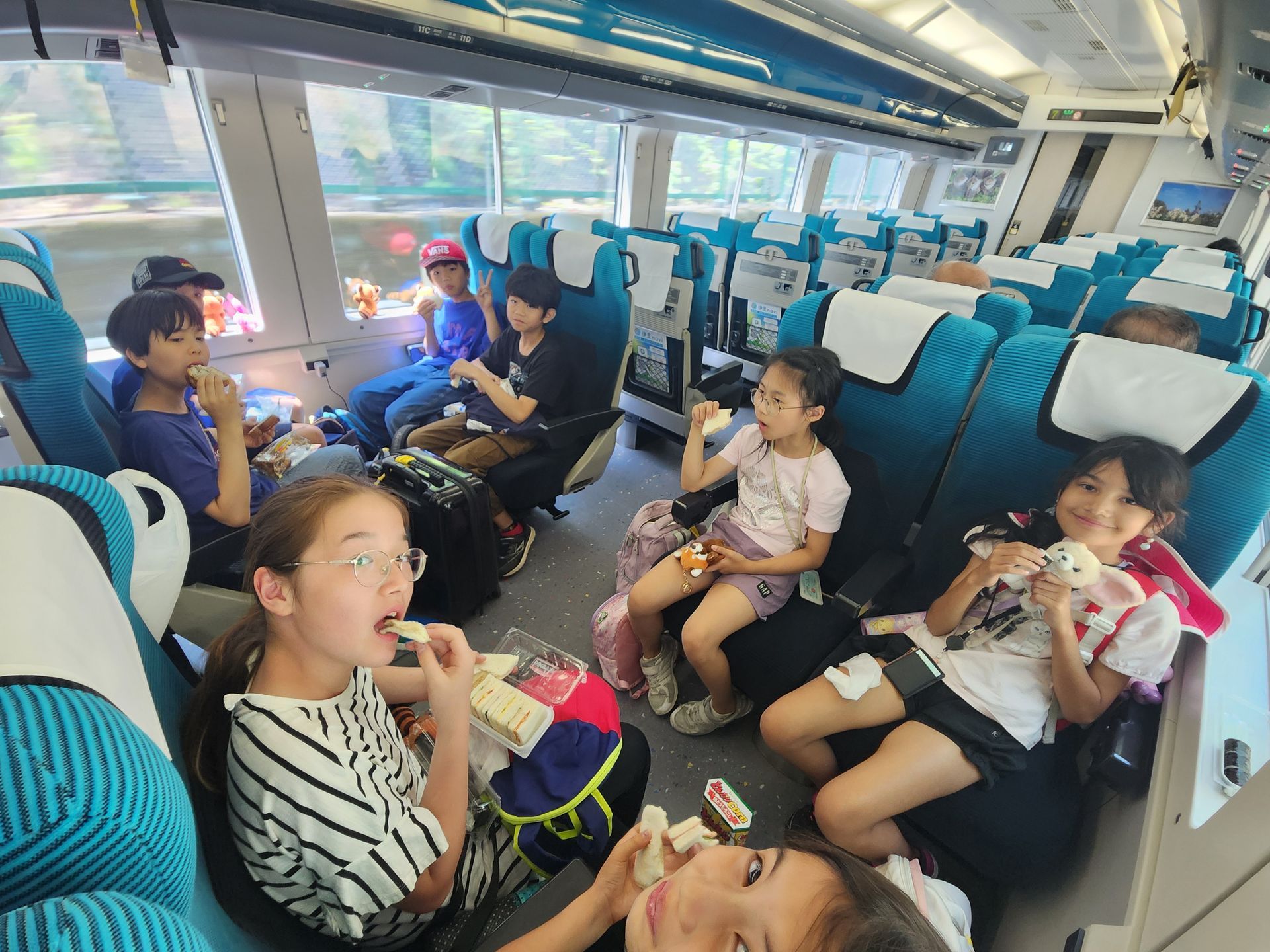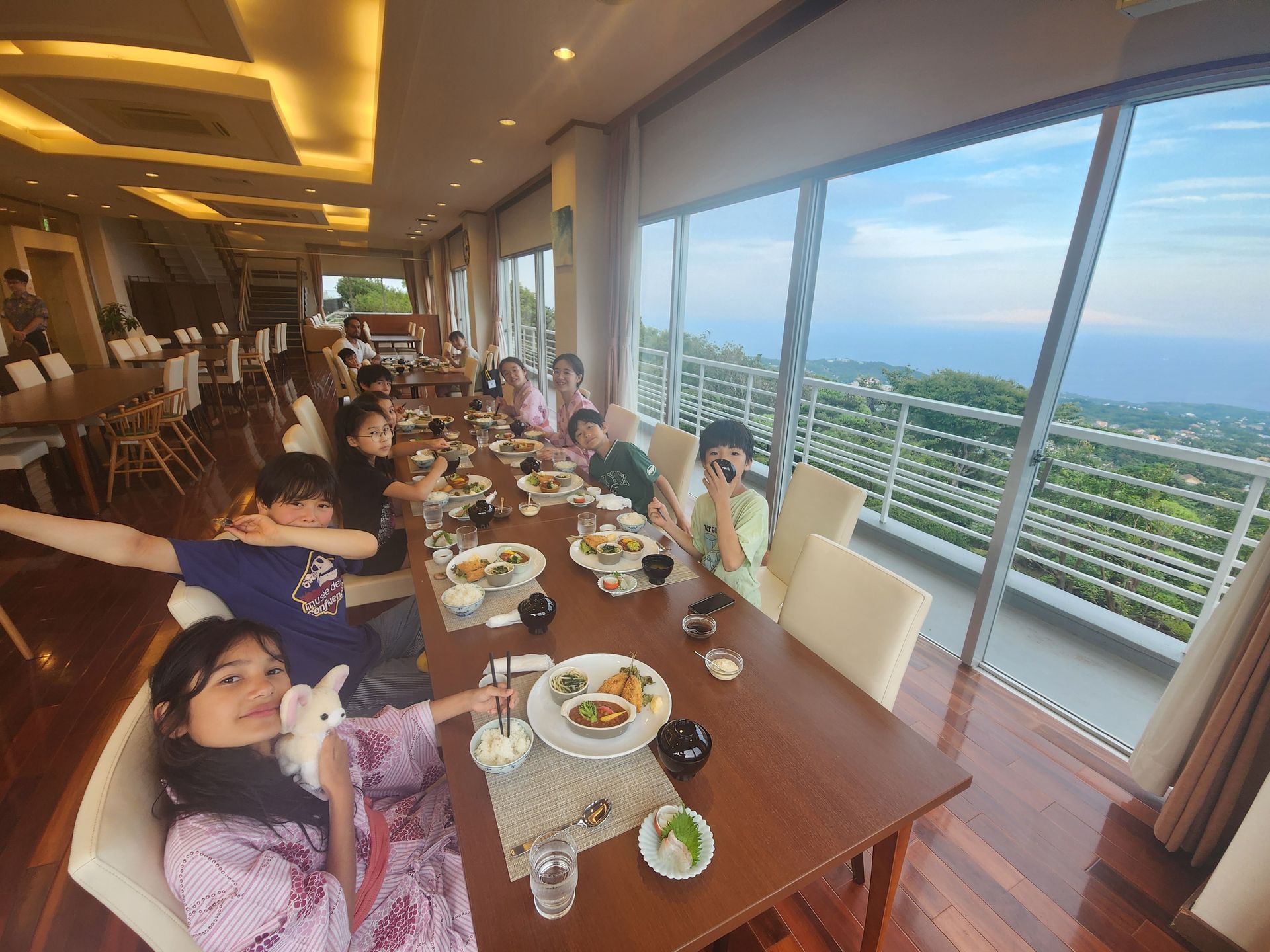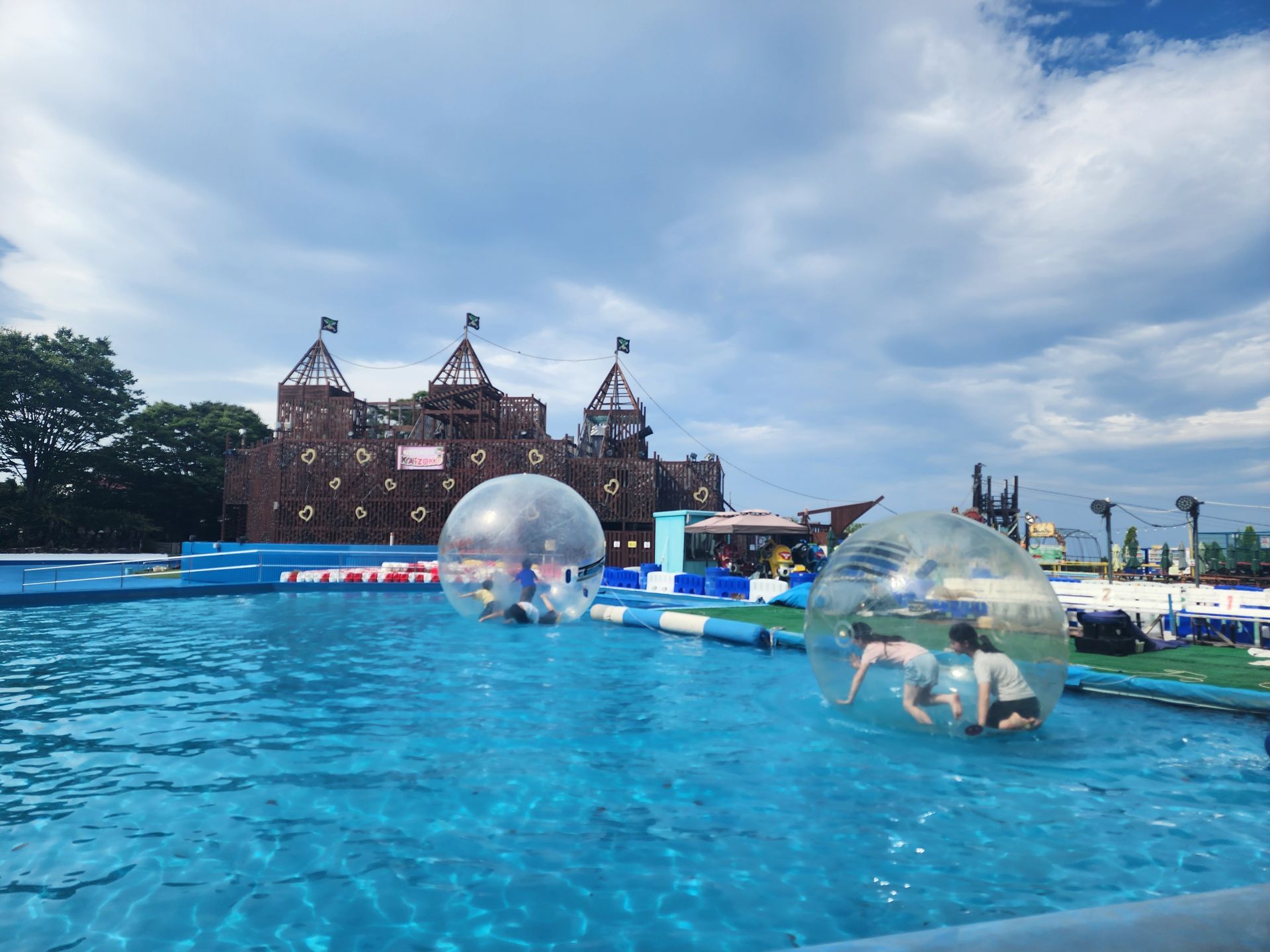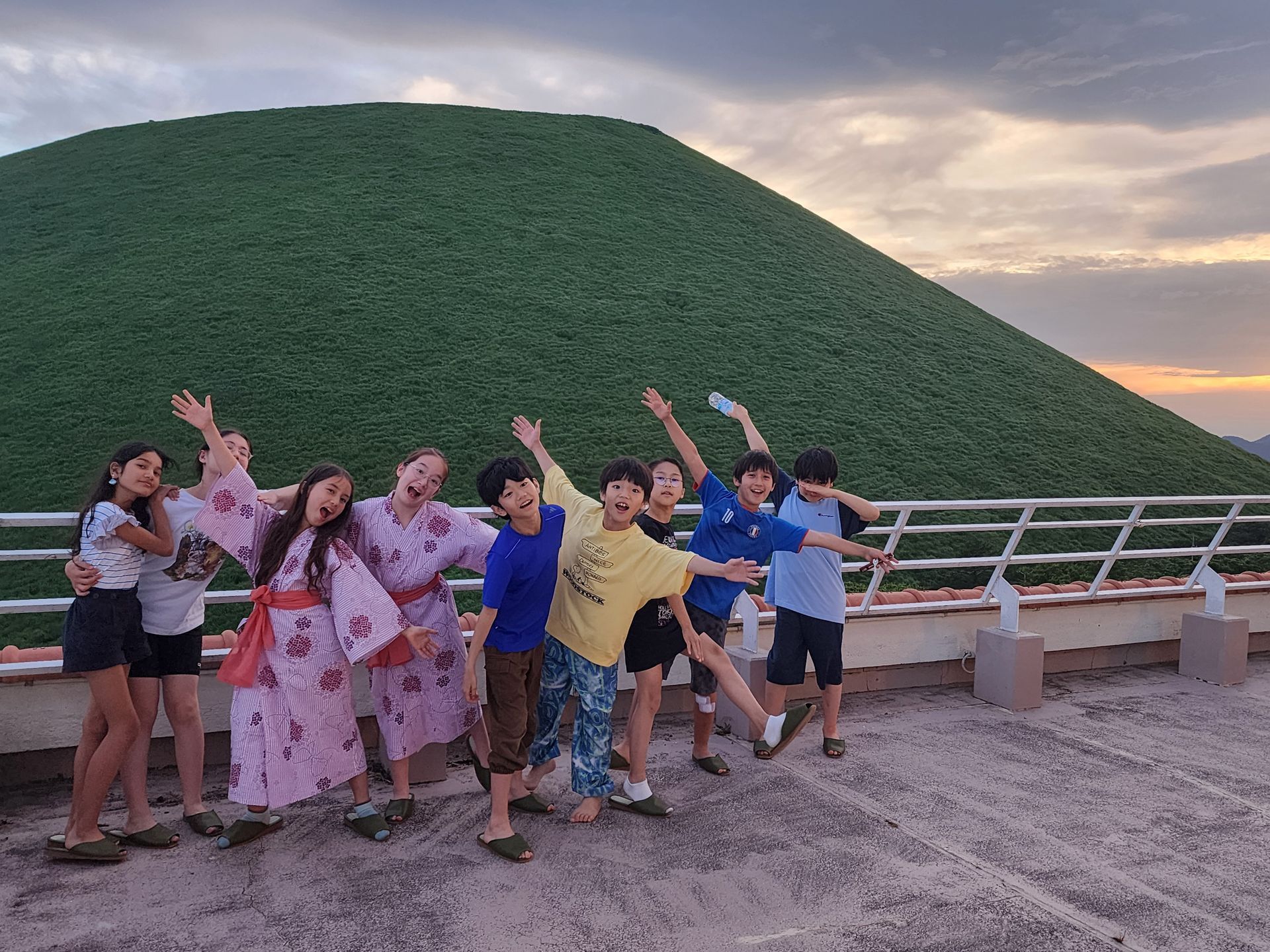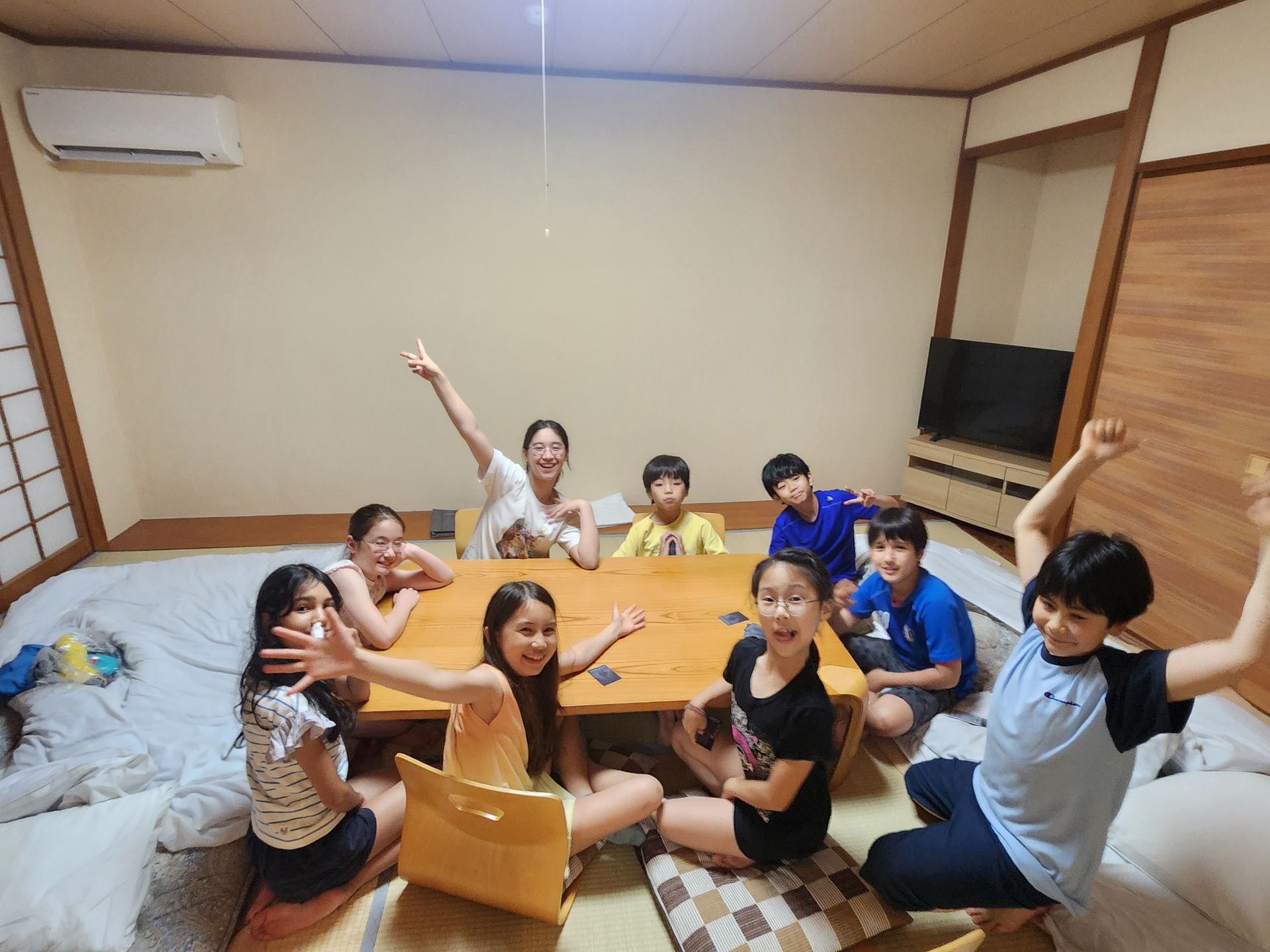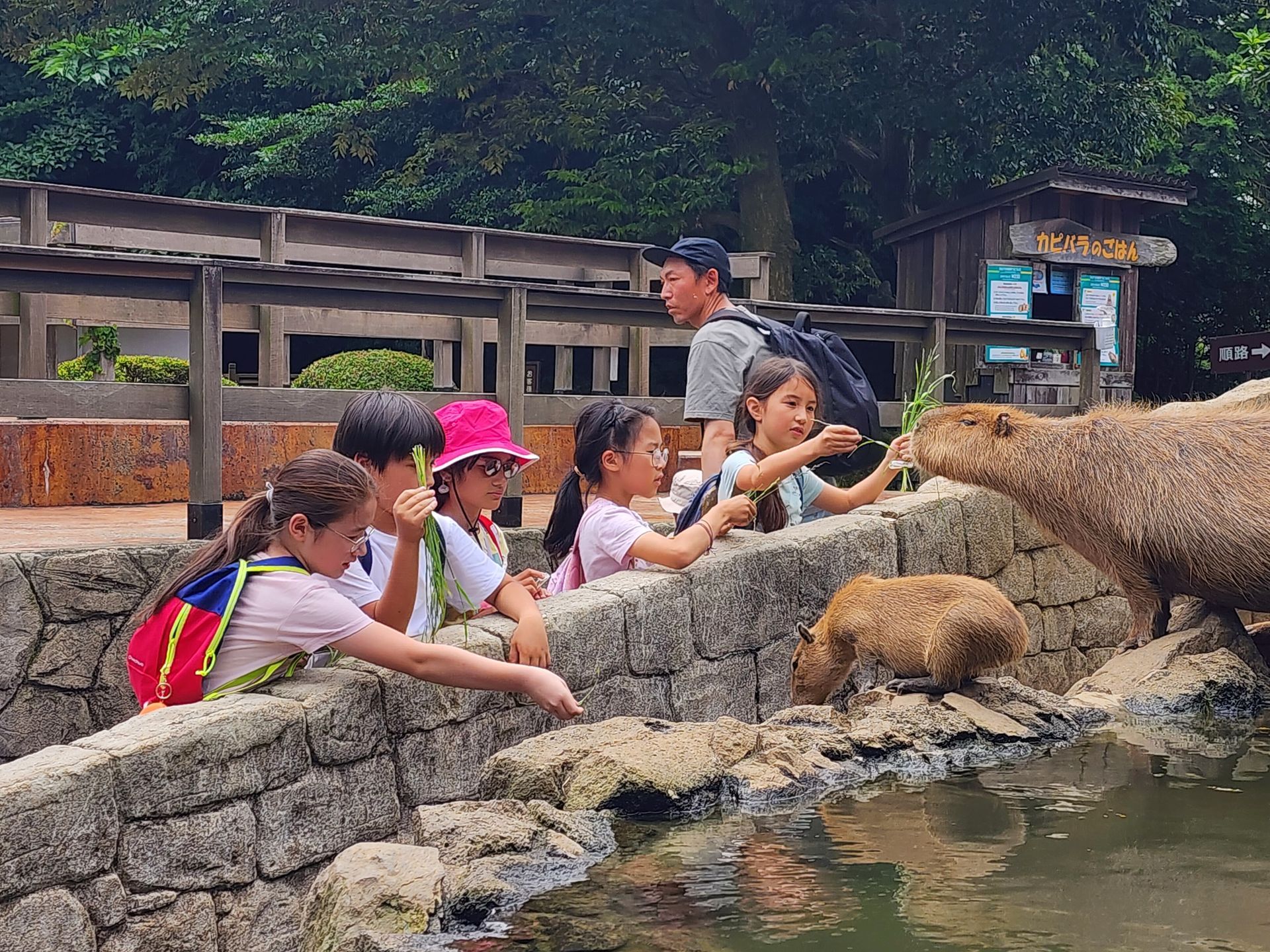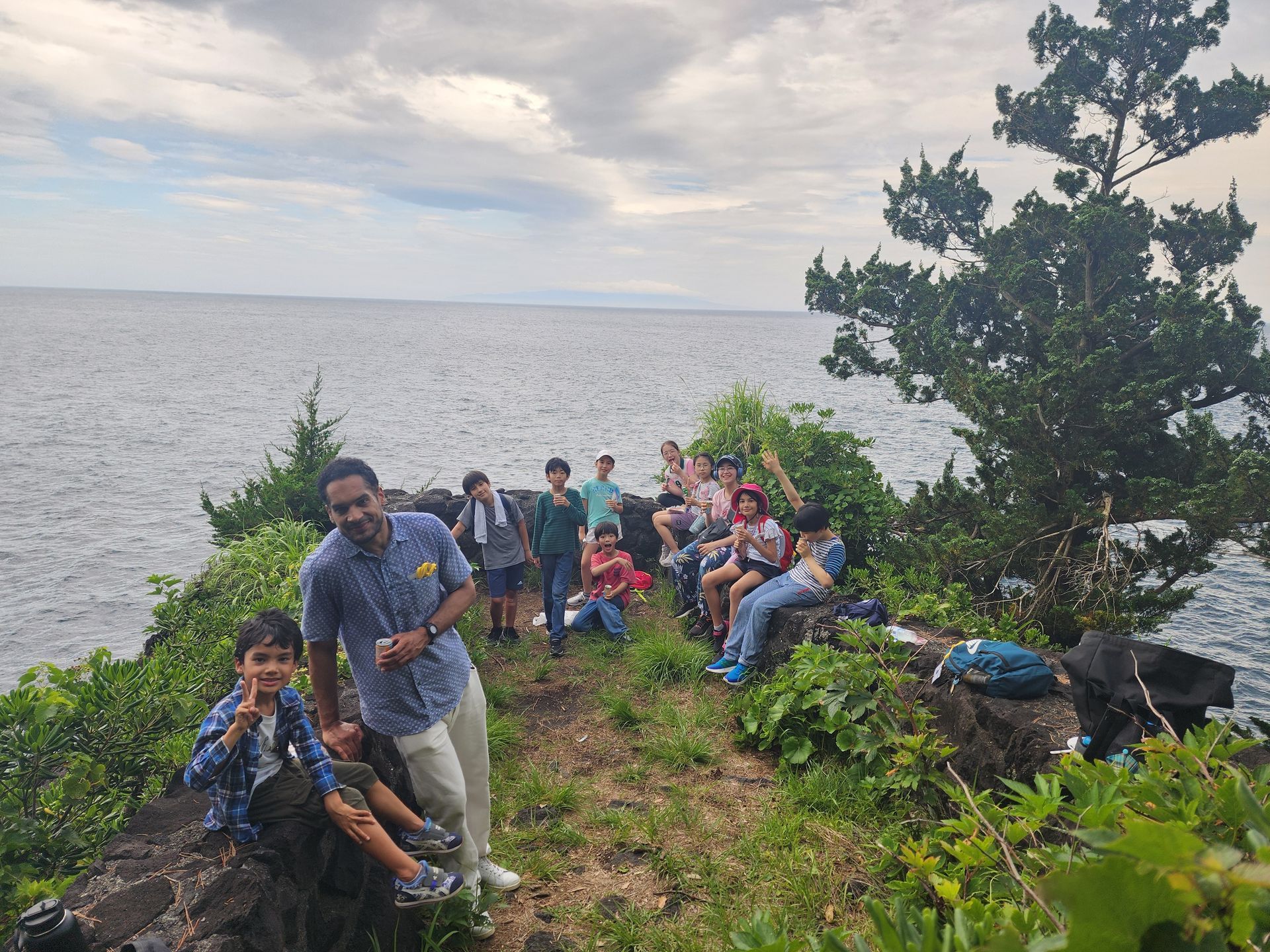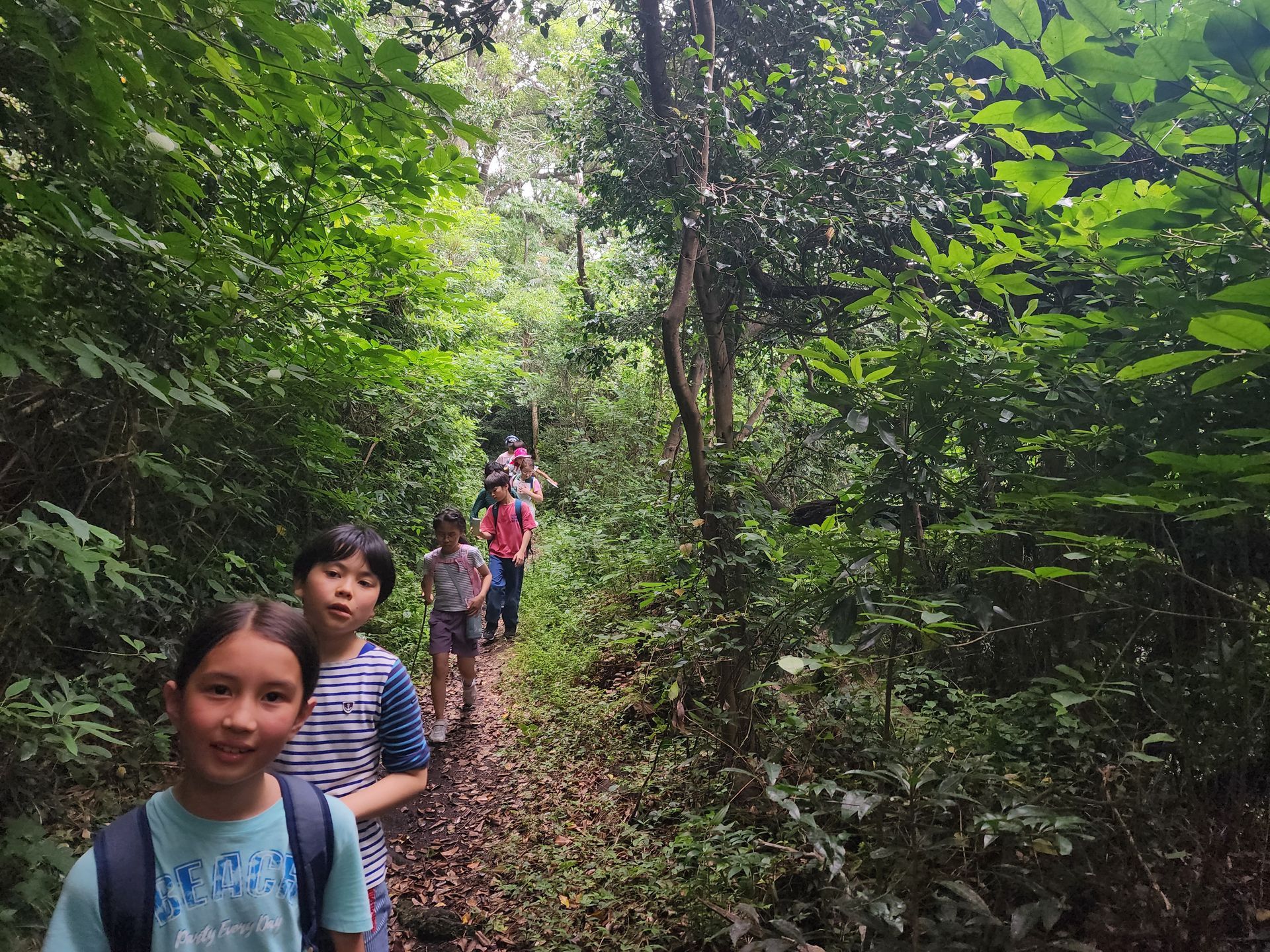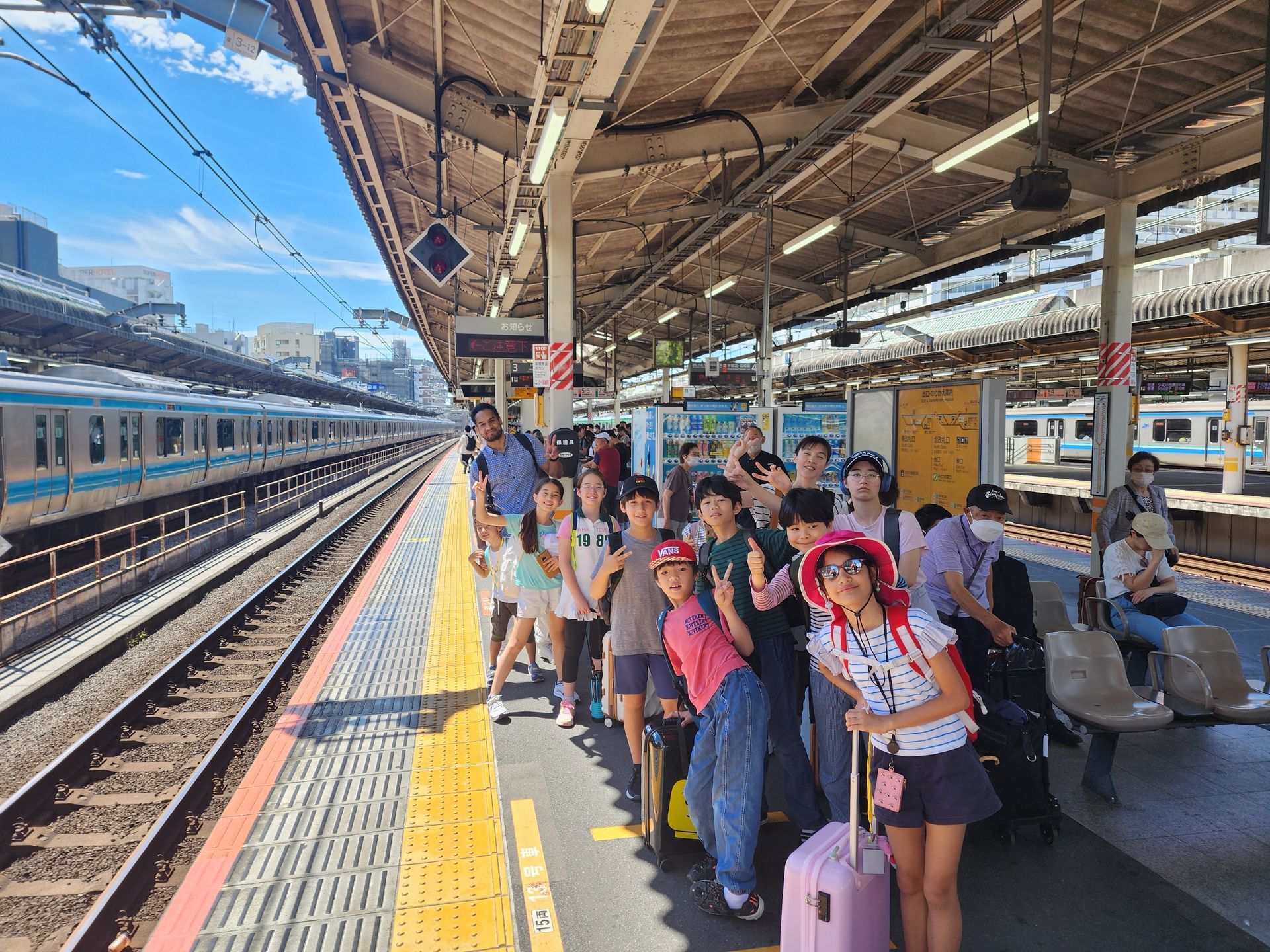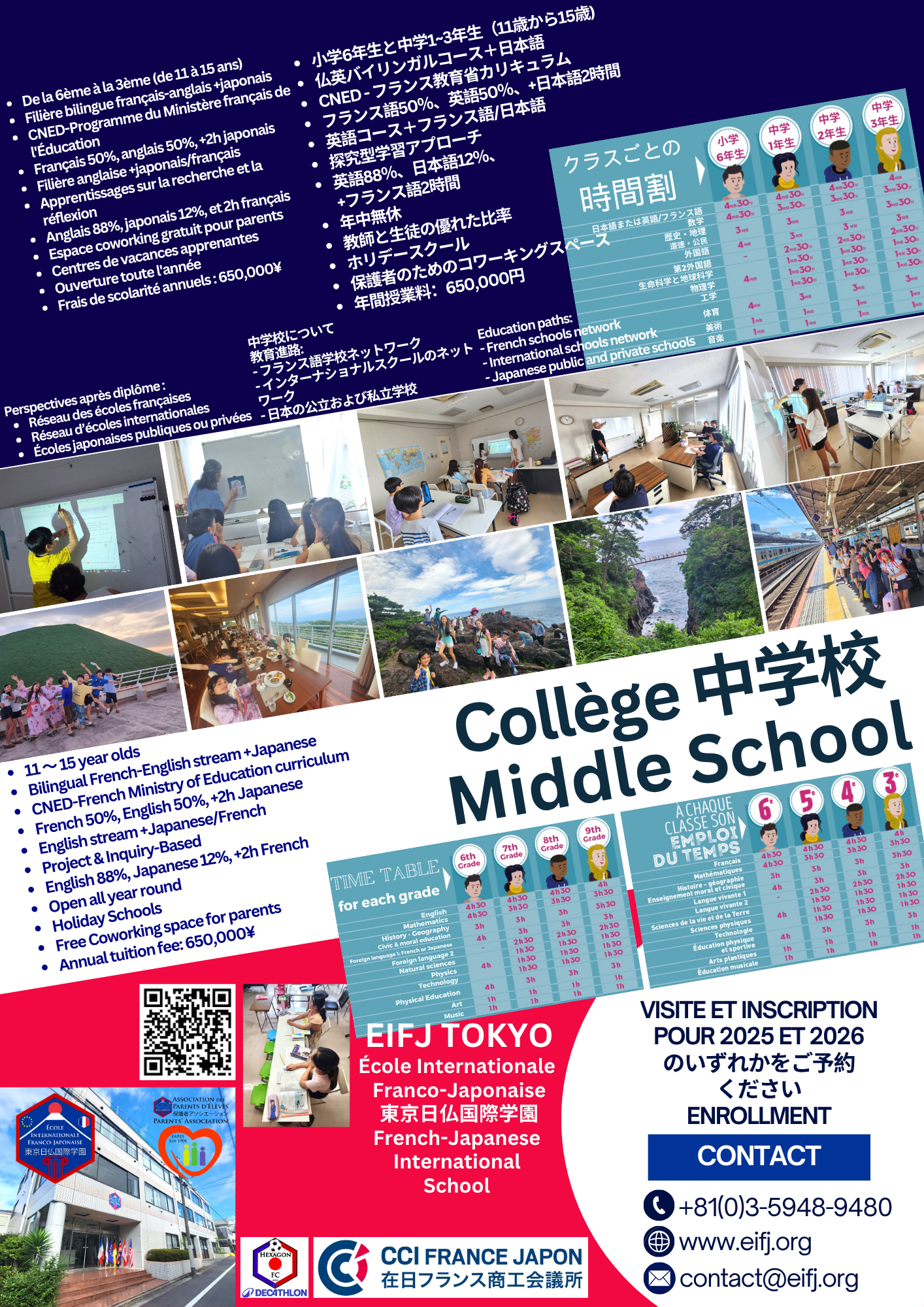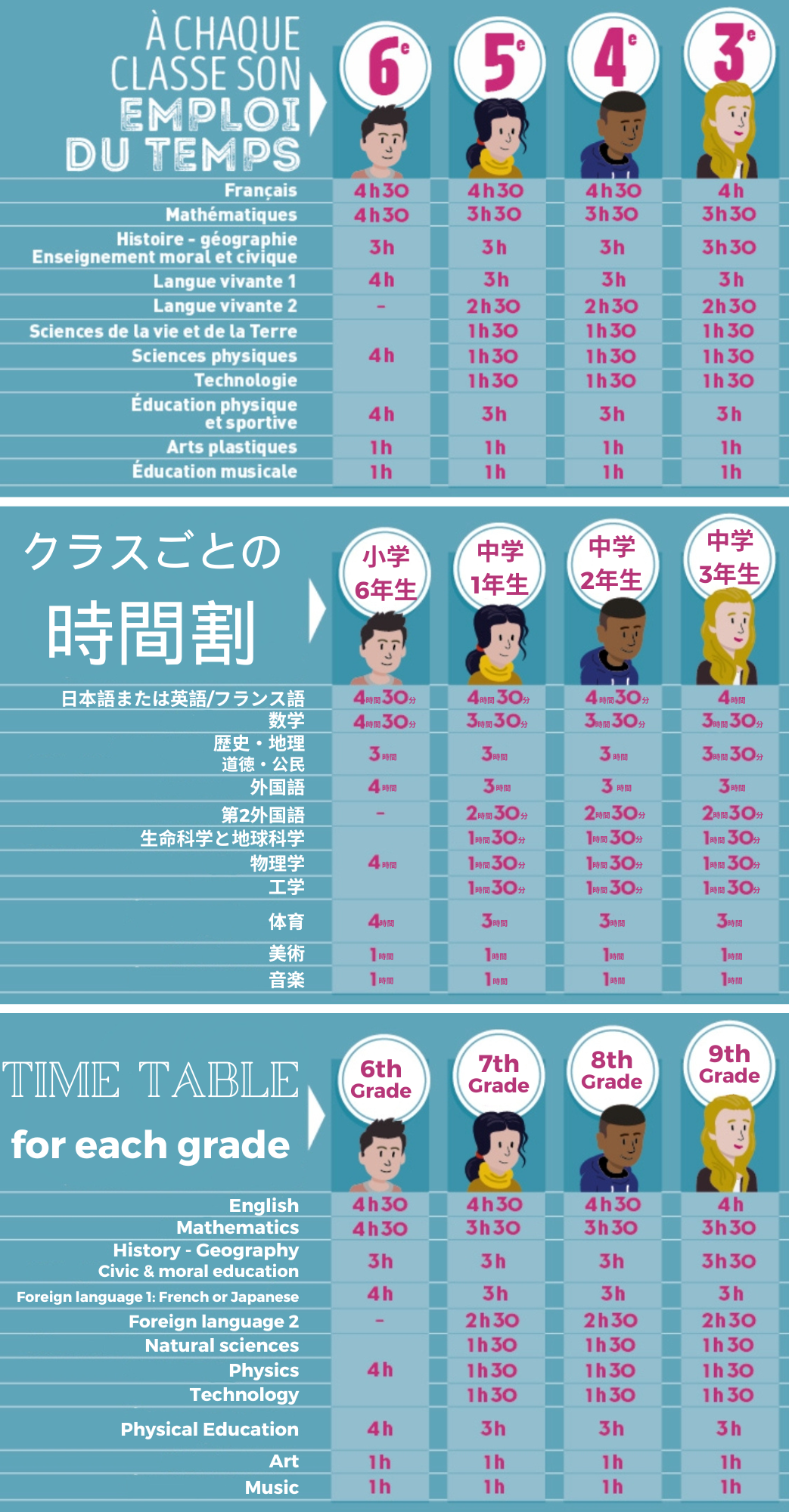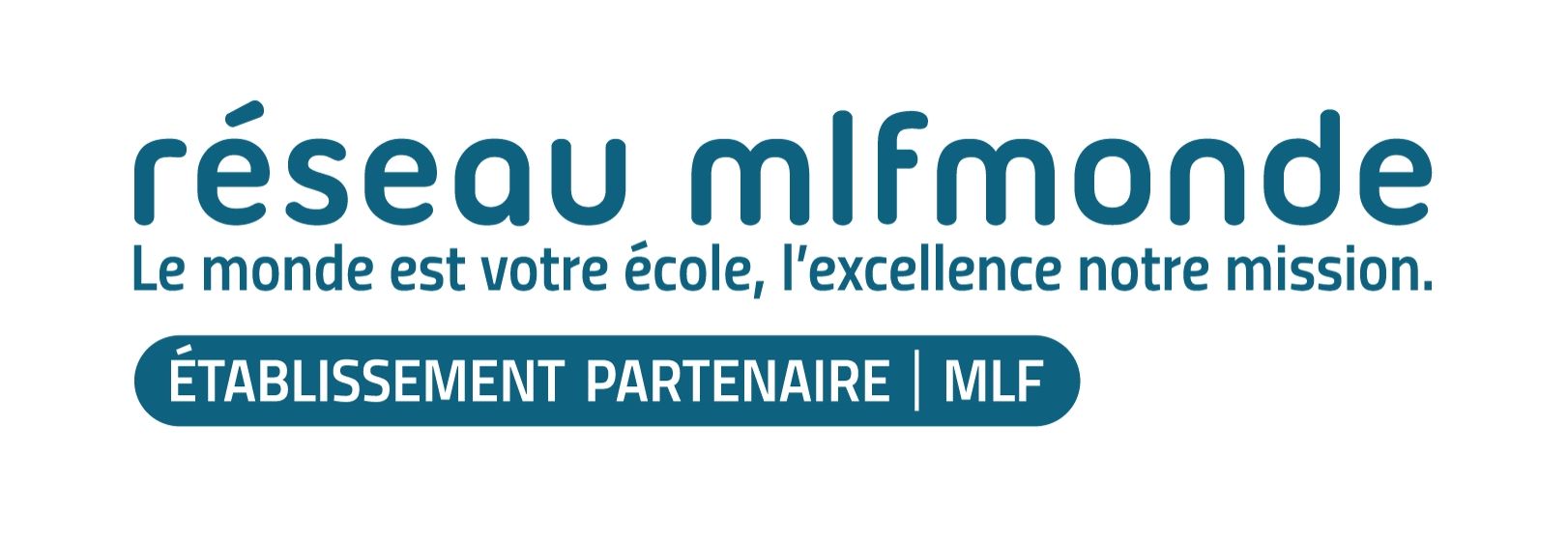FRENCH-ENGLISH BILINGUAL
OR
ENGLISH MIDDLE SCHOOL +JAPANESE
AT THE FRENCH-JAPANESE INTERNATIONAL SCHOOL & MIDDLE SCHOOL OF TOKYO
A Middle School where all students have equal chances of success, for a successful entrance in high school
French, English and Japanese teachers, CNED repeaters, personalized support to help each student at his or her own pace, a team committed to student success.
Unique in Japan: French-English stream, +Japanese, CNED and French Ministry of Education program
English stream (+ Japanese/French), a middle school putting Project & Inquiry-Based Learning at the heart of its curriculum, supported by teachers
Ambition of accreditation of its Inquiry-Based program
Open all year round
For more information about enrolling at EIFJ Middle school, CNED courses, a tour of the school, and any other inquiries, please contact the administration directly.
At EIFJ, our curriculum is built on the official objectives of the French Ministry of Education, ensuring a rigorous, structured, and internationally renowned education. With the goal of accrediting in the future is Inquiry-Based programs, we enrich this strong academic foundation with a global, inquiry-based approach that fosters curiosity, creativity, and critical thinking.
Our Bilingual French-English program follows the French Ministry of Education's calendar, and Inquiry-Based Learning, ensuring close alignment with French curricula and diploma requirements. Students benefit from a balanced curriculum with 13 hours of instruction in French and 13 hours in English weekly (50% French, 50% English), plus two hours of Japanese. These 28 hours of weekly instruction can be complemented by a variety of extracurricular activities in Japanese, English, French, art, science, and more, available from 15:45 onwards.
Our English program is aligned with Common Core standards, the French curricula and a Project and Inquiry-Based approach. Students receive 23 hours of instruction in English and 3 hours in Japanese weekly (88% English, 12% Japanese), with an additional two hours of French offered. Extracurricular activities in Japanese, English, French, art, science, and more are available from 15:45 onwards, complementing the 28 hours of weekly instruction.
In the French-English program, Japanese lessons in the elementary and middle school follow an adapted curriculum designed to build both language skills, cultural and historical knowledge. Using selected MEXT-approved textbooks and learning materials, students engage in continuous practice of hiragana, katakana, and a progressive introduction to kanji suited to their level. Lessons also explore Japanese culture, history, and geography, helping students develop a rich understanding of Japan’s traditions, society, and regional diversity. Students are often grouped by proficiency so that both beginners and more advanced learners receive instruction tailored to their abilities.
In the English program, Japanese lessons in the elementary and middle school programs follow the official curriculum set by MEXT (the Japanese Ministry of Education, Culture, Sports, Science and Technology) within an IB PYP learning environment, for which the school is currently a candidate. Classes use official MEXT-approved textbooks and learning materials, ensuring that students receive the same high standard of education as in Japanese public schools. This rigorous approach also prepares students for potential entrance exams into private schools.
The program’s primary focus is on the progressive mastery of the Japanese language, with continuous practice of hiragana, katakana, and a structured approach to learning kanji in accordance with grade-level expectations. In addition to language acquisition, lessons cover Japanese culture, history, and geography as required by the national curriculum, fostering a deep understanding of Japan’s traditions, society, and regional diversity. Students may be grouped according to their proficiency levels, ensuring that both native-level and lower-level learners receive instruction tailored to their needs. This approach allows Japanese students to stay fully aligned with their home-country academic standards while benefiting from the inquiry-driven, project-based international learning environment of EIFJ.
Middle school education is structured into four grade levels organized into pedagogical cycles. These cycles allow for the assessment of students' skills and knowledge over extended periods, enabling more effective academic support.
TIMETABLES IN GRADES 6 TO 9 (cycle 3 & 4)
The purpose of the sixth grade is to consolidate the fundamental knowledge acquired in elementary school and to introduce students to the disciplines and methods specific to secondary education. A school report, containing the periodic assessments of cycle 3 and the end of cycle 2, is sent by the schools to the middle school teams in order to facilitate the implementation of pedagogical support in the context of the teaching provided in sixième (common and complementary teaching).
The number of hours of compulsory courses applicable to students in Grades 6 to 9 (26 hours):
Our curriculum includes: Physical Education (4 hours), Arts (Visual and Musical, 2 hours), French/Other Language (4.5 hours), History-Geography & Moral and Civic Education (3 hours), Modern Language (4 hours), Mathematics (4.5 hours), and Science, Technology, Physics-Chemistry (4 hours).
EIFJ promotes international understanding through bilingual education, cultural exchange, and innovative teaching. We foster essential social skills such as respect, multilingual and multicultural communication, and collaboration, preparing students for balanced and fulfilling lives. Our dedicated team of French, Japanese, and English-speaking teachers delivers our programs.
8:30 : first round of classes
Noon: lunch (meal provided by the family or EIFJ cafeteria)
13:00 : second round of classes
16:00 : beginning of the after-school activities, homework sessions, clubs
PEDAGOGICAL PROJECTS CONDUCTED DURING THE SCHOOL YEAR
- September:
- National Air Quality Day (Middle School, Cycle 4)
- National School Sports Day (JNSS) (Elementary and Middle School)
- October:
- Climate Week (Grades 4-5 and Middle School, Cycles 3 and 4)
- Taste Week (Kindergarten, Elementary, Middle School, Cycles 1, 2, 3 and 4, projects related to sensory awakening, discovering flavors, balanced diet)
- Science Festival (Kindergarten, Elementary, Middle School, Cycles 1, 2, 3 and 4)<<<
- October 16: World Food Day (Cycles 1, 2, 3 and 4)
- October 17: International Day for the Eradication of Poverty (Middle School, Cycle 4)
- November:
- November 11: Participation at the French Embassy in the Ceremony commemorating the Armistice of November 11, 1918
- 2nd Thursday of November: Anti-Bullying Day at School (Elementary, Middle School, Cycles 2, 3 and 4)
- November 20: International Children's Rights Day (Kindergarten, Elementary, Middle School, Cycles 1, 2, 3 and 4)
- European Week for Waste Reduction (Middle School, Cycle 4)
- December:
- December 9: Laïcité Day (Secularism Day) (Elementary and Middle School, Cycles 2, 3 and 4, work on the values of the Republic, freedom of conscience, equality)
- December 20: International Human Solidarity Day (Cycles 2, 3 and 4, from G1 to G7)
- January: January 27: International Holocaust Remembrance Day (Day of memory for genocides and prevention of crimes against humanity) (G4-5 and Middle School, Cycles 3 and 4)
- February: Safer Internet Day (Cycles 2, 3 and 4, Elementary and Middle School)
- March:
- March 8: International Women's Day (Elementary and Middle School, Cycles 2, 3 and 4)
- Maths Week (Kindergarten, Elementary, Middle School, Cycles 1, 2, 3 and 4, participation in the Kangaroo and Koala Math contests)
- La Grande Lessive (The Big Wash - display of artistic creations)
- Poets' Spring (Kindergarten, Elementary, Middle School, Cycles 1, 2, 3 and 4)
- March 22: World Water Day (Elementary and Middle School, Cycles 2, 3 and 4)
- April:
- April 22: Earth Day (Kindergarten, Elementary, Middle School, Cycles 1, 2, 3 and 4)
- April 23: World Book and Copyright Day (World Book and Storytelling Day), and English Language Day
- May / June: European Sustainable Development Week (Cycles 2 and 3, from G1 to G5)
- June 8: World Oceans Day (Middle School, Cycle 4)
EVENTS BRINGING TOGETHER THE FRENCH, BINATIONAL, JAPANESE, AND THE INTERNATIONAL COMMUNITY (Calendar)
- September: Family orientation and welcome picnic, class photos
- October: Kita-ku Furusato Kumin Festival, French and International Schools of Japan's Run, Halloween Haunted House Hunt
- November: Kita-ku Nishigaoka Family Festival, school integration trips, Thanksgiving
- December: Christmas concerts and parties
- January: King's cake celebration (Galette des Rois), French-German Day, Snow Day
- February: Candlemas (Chandeleur), Setsubun, Lion Dance (Shishimai)
- March: Mardi Gras (Fat Tuesday), Saint Patrick's Day, Japanese Academic Year Graduation Ceremony
- April: April Fool's Day, Spring School Marathon, Hanami picnic, Koi no Bori (Carp Streamers), Easter egg hunt
- May: Europe Day and welcoming of a European Union Ambassador
- June: End-of-Year School Concert and Graduation Ceremony
- July: Tanabata Festival, Children's Bastille Day (14 July)
- August: Sea festival
2025-2026 CLASSES AND OTHER LANGUAGES IN MIDDLE SCHOOL
- Bilingual French-English class 6th to 9th Grade (11 to 15 year olds)
- English Class 6th to 9th Grade (11 to 15 year olds)
- Japanese language from 6th Grade
- German language from 5th Grade
- Spanish language from 5th Grade
Depending on the increase in the students' headcount, single-grade classes will be created, and additional teachers recruited.
Citizenships of students enrolled in EIFJ programs as of September 2025: French, American, Japanese, Polish, Irish, French-Japanese, French-Chinese, Japanese-Chinese, American-Japanese, Chinese, Mexican, Bulgarian, Taiwanese, Turkish, Senegalese, Korean, Mongolian, Canadian, Australian, Algerian, Vietnamese, Malaysian, Egyptian.
CLUBS
- Reading Club: Club members meet to present books they have read during the month, based on current themes or free choice. Their presentations lead to discussions, helping students better understand and affirm their literary tastes. Once a month, club members vote for their favorite book of the month, then write a short text in French, English, and Japanese explaining their choice. This text is displayed in the library under the section "Reading Club Favorite" for other students.
- Cinema Club: this club explores the world of film. Activities include watching and discussing a variety of films (classic, contemporary, international, etc.), learning about film techniques (directing, cinematography, editing, etc.), potentially creating short films or analyzing film scripts, developing critical thinking skills related to visual media.
- Press Club: students interested in journalism and media can participate in this club. Activities involve creating a school newspaper or online publication, writing articles, conducting interviews, taking photographs, learning about journalistic ethics and responsible reporting, developing writing, communication, and teamwork skills.
- Dance Club (K-Pop, Hip-hop, etc.): this energetic club provides an opportunity for students to express themselves through dance. Activities focus on learning various dance styles, such as K-Pop, Hip-hop, and others, developing coordination, rhythm, and physical fitness, choreographing routines and performing at school events, promoting teamwork and creativity.
- Multi-Sports Club: this club offers students a chance to participate in a variety of sports and physical activities. Activities include playing team sports, trying individual sports and fitness exercises, developing sportsmanship, teamwork, and physical skills, promoting a healthy and active lifestyle.
- Rubik’s Cube, Chess & Board Games Club: students who enjoy problem-solving and board games can join this club. Activities involve learning different methods for solving Rubik's Cubes, other similar games, and playing board games, improving speedcubing skills, participating in friendly competitions and challenges.
- Dodgeball Club: this fun and active club focuses on the game of dodgeball. Activities include playing organized games of dodgeball, developing agility, throwing, and dodging skills, promoting teamwork, strategy, and sportsmanship in a playful environment.
CALENDAR
The annual program is based on the French academic calendar. From Monday to Friday, EIFJ opens at 7:30 am and closes at 8:00 pm (depending on demand and staff availability). EIFJ is closed on Japanese public holidays. Classes are not held during French school holidays, but students can come to EIFJ free of charge and be supervised by te staff. You can view the tuition fees by clicking here.
FACILITIES
- Equipped classrooms
- Meeting room
- Cafeteria
- Science laboratory
- Computer lab
- Middle school library
- Municipal sports gymnasium located a 10-minute walk away
- Rooftop terrace for all activities
- Indoor gymnasium
- Art room
- Music room
AFTER-SCHOOL & SCHOOL HOLIDAY PROGRAMS FOR MIDDLE SCHOOL STUDENTS
Apart from specific after-school activities in which students may choose to enroll (charged separately), childcare fees do not apply to students from 6th grade onwards. Middle school students are considered autonomous and are supervised by our team members if they remain on campus after classes for their homework and social interactions. Supervision is available Weekdays: 15:30–18:00, Wednesdays: 12:30–18:00. After these times, supervision depends on team availability and demand.
During school holidays (Toussaint, Christmas, Winter, Easter, and Summer), EIFJ Middle School welcomes students in 7th, 8th, and 9th grade (ages 12 to 15).
- Students from EIFJ and other schools are welcome for a fee of 1,100 yen per day.
- EIFJ provides a calm, studious, and comfortable environment, offering access to computers, the library, the gym, the cafeteria, educational games, and more. While students enjoy autonomy, they remain under the supervision of EIFJ educational assistants at all times., including during possible field trips.
- Independent study and revision are encouraged, and students may bring their own school materials. Depending on student needs and staff availability, academic support may also be offered in various subjects such as mathematics, languages, science, and history-geography.
- The program is designed as a flexible, social, and enriching space where students can study, relax, play, and engage in sports and water activities in a safe and welcoming atmosphere, without a structured curriculum. It is an ideal opportunity for friends to meet, collaborate, and learn together in a dynamic and supportive setting.
9th GRADE WORK EXPERIENCE (OBSERVATION INTERNSHIP)
The Year 9 work experience placement, also known as an observation internship, is an important step in students’ educational pathways.
The aims of this placement are to:
- discover the world of work and how a company, public administration or association operates,
- observe one or more professions and better understand professional activities,
- help students reflect on their academic and career orientation,
- learn the basic rules of professional life (punctuality, following instructions, politeness, appropriate dress),
- develop skills such as autonomy, observation and communication.
The placement lasts one week, generally five consecutive days.
It usually takes place during the second term, with dates set by the school.
Working hours are adapted to the student’s age and regulated by law.
The placement may take place in:
- a company,
- a public administration (city hall, hospital, school, etc.),
- an association,
- a public or private institution.
- Certain sectors are excluded for safety reasons (dangerous construction sites, hazardous machinery, etc.).
A work experience agreement is signed by the family, the school and the host organisation.
During or after the placement, students are generally required to:
- keep a logbook or diary,
- write a work experience report,
- sometimes present their experience orally.
This work is part of the assessment process and contributes to the validation of the Parcours Avenir (career guidance pathway).
The company managing the international school, its various branches, as well as its non-profit Parents’ Association (French Law 1901), may host students as part of the Year 9 work experience placement.
Placements may be offered in a wide range of areas, including:
- education and pedagogical support,
- documentation and library services,
- administration,
- public relations and communication,
- human resources,
- project development,
- marketing and promotion of the school’s activities,
- and more.
SPECIFIC INFORMATION RELATING TO THE EDUCATION PATH OF JAPANESE AND MIXED JAPANESE STUDENTS
Students’ transfers from EIFJ Tokyo to elementary, middle and high school in Japan are possible for those who wish. The double enrollment of Japanese or binational elementary students in a Japanese school and EIFJ Tokyo is recommended to comply with the education law, and equivalency is allowed through a close and permanent contact between the Japanese school and EIFJ Tokyo.
Scorecards・Weekly Learning Book・Personalized follow-up
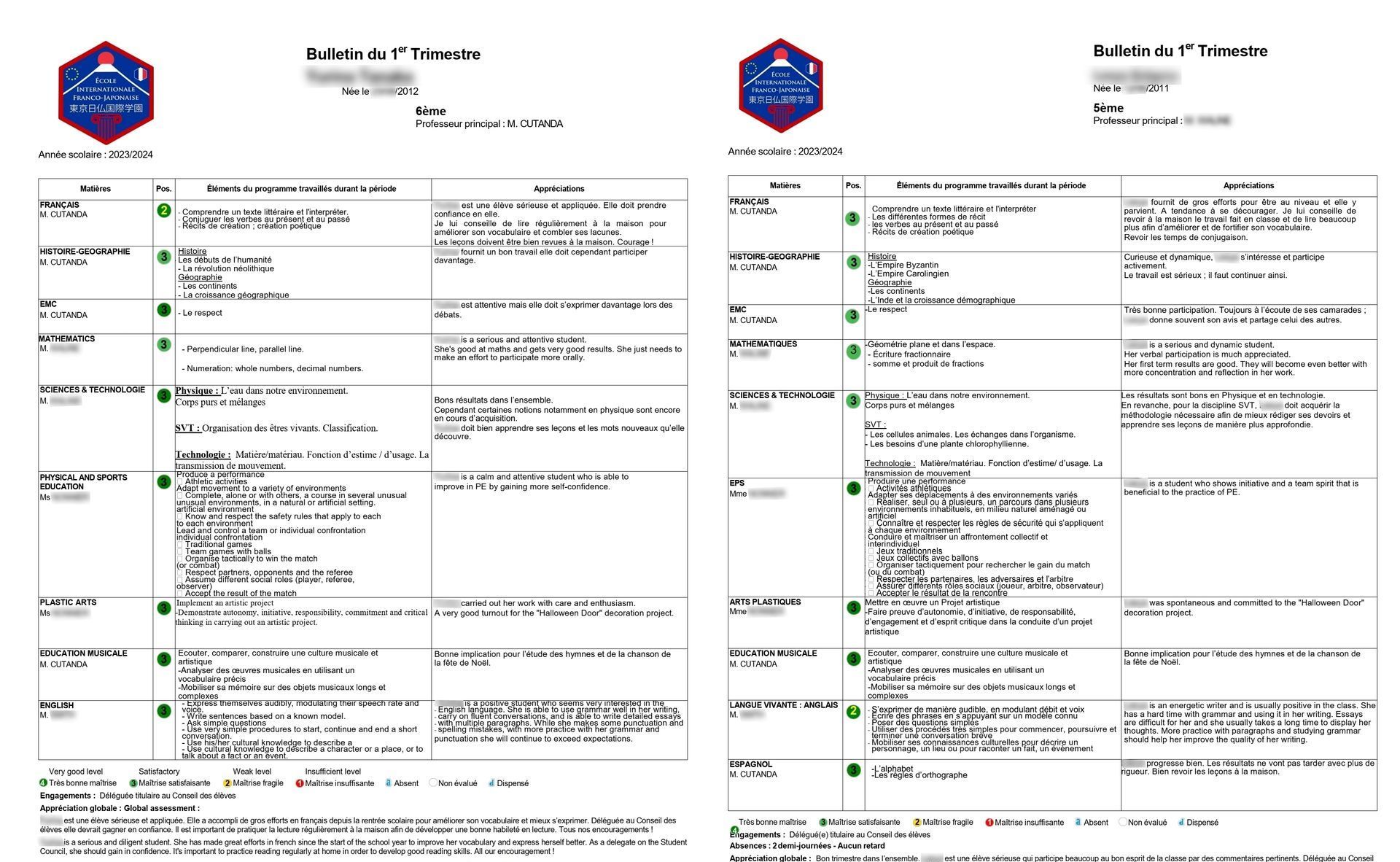
Albums de chaque année scolaire offerts à tous les élèves, 50 pages de souvenirs !
毎年度全生徒に贈られるアルバムは、50ページの思い出!
Yearbooks each year offered to all students, 50 pages of memories!
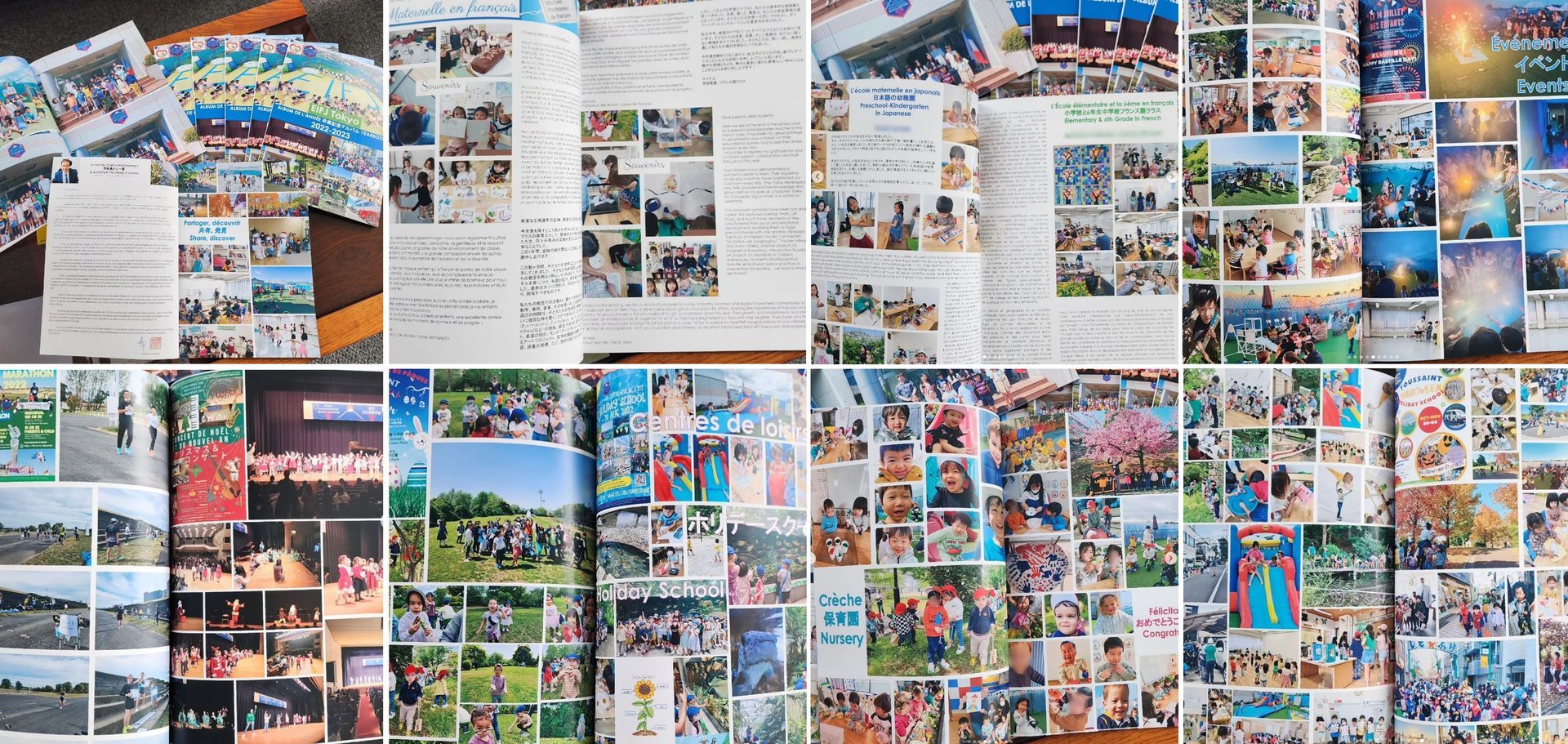
OPEN SCHOOL
Whether you are already a parent at the school or considering EIFJ Tokyo for your child’s education or for participating in our activities, our team warmly welcomes you and opens the doors of the school. Discover our educational activities, let your child share time with our students, ask your questions, and take advantage of the “intermittent class” program, which allows your child to experience one or more days immersed in our nursery, kindergarten, elementary, or middle school classes. Visits are possible Monday to Friday from 10:00 to 12:00 (during study periods) and from 16:00, as well as on Saturdays. Please contact us to arrange an appointment.
In addition, the Parents’ Association is also available by appointment. Families interested in enrollment or wishing to obtain further information may contact the Parents' Association's Board by email at: association.parents@eifj.org.
*Ecole Internationale Franco-Japonaise is a candidate school** for the PYP. This school is pursuing authorization as an IB World School. IB World Schools share a common philosophy- a commitment to high-quality, challenging, international education- that we believe is important for our students.
**Only schools authorized by the IB Organization can offer any of its four academic programmes: the Primary Years Programme (PYP), the Middle Years Programme (MYP), the Diploma Programme (DP), or the Career-related Programme (CP). Candidate status gives no guarantee that authorization will be granted. For further information about the IB and its programmes visit
http://www.ibo.org.



